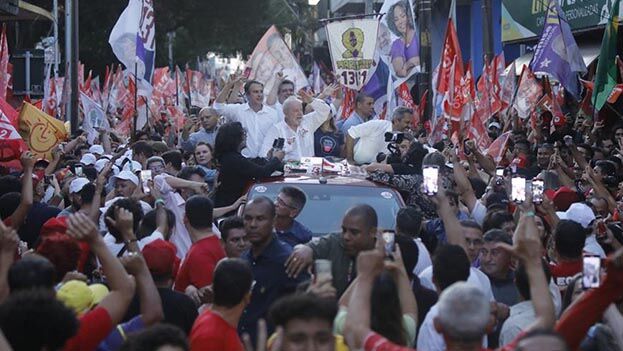
![]() 14ymedio, Elías Amor Bravo, Economist, 31 October 2022 — The Cuban communist state press reacted quickly to Lula’s victory in Brazil’s presidential elections. Díaz-Canel, recovering from his speech to the communists gathered in Havana on the occasion of the XXII International Meeting of Communist and Workers Parties, didn’t miss a moment to congratulate Lula, calling his victory one of “Latin American and Caribbean unity, peace and integration.”
14ymedio, Elías Amor Bravo, Economist, 31 October 2022 — The Cuban communist state press reacted quickly to Lula’s victory in Brazil’s presidential elections. Díaz-Canel, recovering from his speech to the communists gathered in Havana on the occasion of the XXII International Meeting of Communist and Workers Parties, didn’t miss a moment to congratulate Lula, calling his victory one of “Latin American and Caribbean unity, peace and integration.”
The words of Díaz-Canel resonated to old chants like those spoken by economically-ruined Fidel Castro during the Special Period to a triumphant Chávez in Venezuela, who over time became a source of subsidies for the Cuban extractive economy. Perhaps Díaz-Canel believes that history repeats itself, and hence his joy at the triumph of the left in Brazil, with Lula at the forefront.
But sometimes things don’t go the way you want. They happen in another way. And many of us fear that this Lula, in his second presidential period, will not embark on dangerous operations that might return him to the courts he knows so well.
In fact, in his victory speech, he already worried about making his objectives clear: combating Brazil’s misery and poverty and uniting society after very divisive elections. How he does it and, above all, his appeal to the enormous potential of the Brazilian economy, will be a matter to take into account.
He reiterated his commitment to the environment and announced that he will resume the protection of biomass in the country, especially the Amazon. This is a rough matter, especially if he wants to receive support from the Chinese, whose model of global exploitation has little to do with protecting the environment. This bet takes him away, perhaps without knowing it, from those who could be his main allies in this new stage.
With an agenda like the one proposed by Lula, the position of the Cuban communist regime will be weakened. The failure of the Mariel weighed a lot on the state of economic relations between the two countries. The data is eloquent.
In 2016, Brazil represented 2.8% of exports and 5.2% of Cuban imports. Five years later, the respective percentages were 0.11% and 2.8%, respectively, bringing along a trade deficit and increasingly reduced trade. There is little business for a country like Brazil, with more than 200 million inhabitants. Exports fell by 96%, imports by 48%.
Regarding tourism, out of the 35,000 Brazilians who arrived on the Island in 2016, there were 416 in 2021, in the midst of the pandemic. Unlike other tourism markets in Cuba, Brazil didn’t register the highest value in 2019, and in 2018, reaching 41,000 tourists, it was barely 0.87% of the total. Compared to the country’s population potential, tourism from Brazil to Cuba is insignificant.
And more data could be offered, all of them equally eloquent. The powerful Brazilian economy has little, scarce interest in what Cuba can offer, and also, Cuba’s purchasing potential is insignificant to sustain a stable framework of relations with Brazil. So between the two countries, the flows of capital and business leave much to be desired.
Can it happen that Lula changes the character of these tendencies? Of course, that’s what Díaz-Canel wants, but is Lula in a position to mortgage the future of Brazil to someone who doesn’t pay or who does it late and badly? What benefit can Lula obtain from the Cuban communist regime located at the antipodes of this national reconciliation project of which Lula speaks? What does Cuba have to offer Lula, besides doctors, spies, coaches, etc.?
Some advisor to Díaz-Canel should have listened to Lula’s victory speech in a little more detail, especially when he said that his victory is “for all women and men who love democracy and want freedom,” and then added clearly that “it’s not a victory for me or the PT (Workers’ Party).” Díaz-Canel’s opportunistic message of congratulations to Lula was along the opposite line, when he said, “but they could not prevent you from winning with the people’s vote. The Workers’ Party of Brazil returns; social justice will return.” This is just what Lula doesn’t want to hear, in search of that unity he talked about. With this type of leftist and radical approach, Cuba and Brazil will not go very far. Time will tell.
It’s evident that there is a clear difference between the speeches of the two leaders, and the impression is that Brazil will go it alone and not show a particular interest to the Cuban communist. It’s enough to listen to another of Lula’s speeches to realize his intention to govern for all. “This is a victory for all women and men who love democracy, who want freedom, who want culture, education, fraternity and equality.” In short, it’s a clear concern about “how to begin defining and repairing this country.” The messages of “decadent capitalism, the victory of socialism, the recovery of the ideas of Marx, Engels and the Communist Manifesto,” and other stupidities enunciated by Díaz-Canel at the meeting in Havana, were not even heard in Lula’s speech. He has learned his lesson. We’ll see how everything ends.
Translated by Regina Anavy
____________
COLLABORATE WITH OUR WORK: The 14ymedio team is committed to practicing serious journalism that reflects Cuba’s reality in all its depth. Thank you for joining us on this long journey. We invite you to continue supporting us by becoming a member of 14ymedio now. Together we can continue transforming journalism in Cuba.
